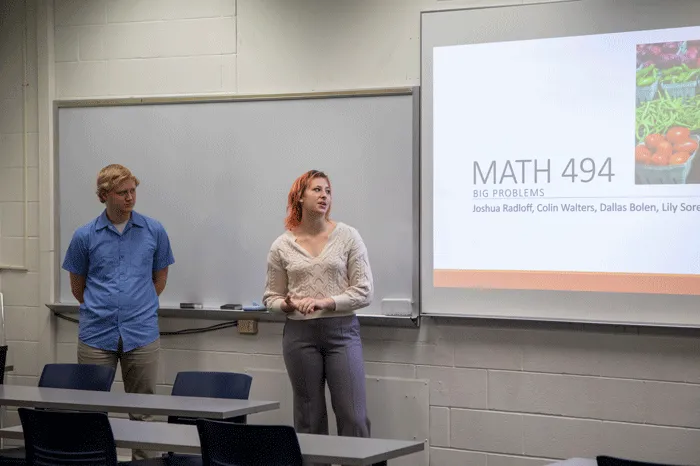
Five students from four different academic backgrounds have come together this semester to use their math skills to help solve a significant problem for a local food insecurity nonprofit.
As part of the PIC (Preparation for Industrial Careers) Math program, Morgan Szucs ’24, Lily Sorensen, Joshua Radloff ’25, Colin Walters ’25, and Dallas Bolen ’27 were selected by Assistant Math Professor Michelle Jeitler to help Community Food Initiatives (CFI) solve an efficiency problem.
“The problem that we have collectively decided is to help solve is that CFI does not have a method of measuring how much they bid on produce at CPA (the Chesterhill Produce Auction) to have a sustainable business practice,” says Dallas Bolen ’27, a Biochemistry major and a College Credit Plus student. CPA is one of the suppliers of produce for CFI’s food distribution program. “Exactly what range or what amount do they need to bid for specific produce items so that they can go in and know that they’re not going to (overbid) and run in the negative. The solution that we are going to come up with is to create a resource based on past data that can allow anyone from CFI to bid on and purchase produce in a thrifty and sustainable way.”
Jeitler applied to the PIC Math program, which is run by the Mathematics Association of America, and was one of 14 professors nationally to be accepted.
“The program helps you develop and design a mathematics course that pairs with an industry/non-profit/government organization to help them solve a problem using mathematics,” Jeitler says. “The program is designed to help students understand the real-world applications and careers in mathematics.”
During a routine presentation, the group discussed the progress they have made in understanding the obstacles that the Athens-based non-profit faces when purchasing and distributing produce to underserved people in the region. CFI offers an array of services aimed at addressing food insecurity. The student group chose to analyze facets: the Donation Station and the Veggie Van.
“The Donation Station started in 2007,” says Szucs. She and Sorensen are Actuarial Science majors. “With the help of farmers, vendors, and organizations, they are working to fill the gap of food insecurities throughout the MOV. It’s a food bank that runs 12 months a year and has 40 to 50 partners. Veggie Van started in 2020, and it provides produce to underserved communities. It is a mobile farmstand and it is donation-based. The prices are not set — it’s pretty much a ‘give what you can’ mobile farmstand that runs seven months a year.”
Radloff, an Education (Adolescent/Youth Adolescent – Math) major, says the data provided to their group by the non-profit covers multiple years and a range of services, which presented their first challenge.
“This is a ton of data to look at, so we’re going to organize it to look at averages, means, produce prices and stuff like that,” Radloff says. “We may look into using some AI (artificial intelligence) to help us process this data because it’s a lot to do by hand and I don’t think we could get it all done this year. We’re looking at different ways to organize this data and then create a master Excel sheet for each different folder.”
Additionally, the group plans to look at other potential data streams, including the types and fuel efficiency of the vehicles being driven to the Chesterhill Produce Auction (CPA), and the wages of the workers. From the Athens pantry, the auction location is about a one-hour, round-trip drive.
“We are working with this raw, itemized data to figure out a way to maximize the purchasing power of what we’re going to get at the CPA, but also minimize travel time being spent on the highways, and maximize the amount of people that we reach, minimize the amount of money that we spend and maximize the impact that we have on those people who are not as able to travel to or get fresh produce. So that’s the umbrella topic for us this semester,” Walters, a Math and Physics major, says.
Maribeth Saleem-Tanner, Executive Director of Community Food Initiatives, attended the first group presentation and was excited about the students’ progress.
“The information about the amount of data we had is true and so is the question about pricing,” Saleem-Tanner says. “We are not staffed with a group of folks who know data analysis and finance, so they’re bringing some great insight and some really interesting questions to the table.”
The students will meet throughout the semester, fill out timecards, and make routine oral and written presentations on their progress.
“This is a very valuable course for the students as it puts them in the driver’s seat for how they want to solve the problem, gives them experience working collaboratively with many different personalities, teaches them how the real world is going to work, and shows them the value of mathematics in a non-academic setting,” Jeitler says.